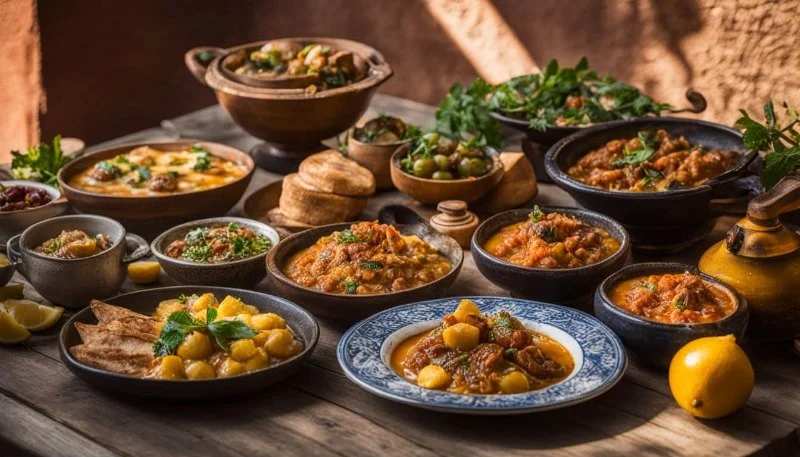
Exploring the Flavors of Andalusia: A Culinary Journey
- 1-The Cultural Richness of Andalusia
- 2-The Core Ingredients of Andalusian Cuisine
- 3-Signature Dishes From Andalusia
- 4-The Role of Olive Oil in Andalusian Cooking
- 5-The Sweet and Spicy Twist of Andalusian Flavors
- 6-Where to Experience Andalusian Cuisine in the U.S.
1. The Cultural Richness of Andalusia
Andalusia, located in the southern part of Spain, is a region rich in cultural heritage and culinary traditions. The region’s history is a blend of various civilizations, including the Romans, Moors, and Christians, all of which have left their mark on its culinary practices. The mix of influences from these diverse cultures is reflected in Andalusian cuisine, offering a unique blend of bold, rustic flavors, fresh ingredients, and a deep connection to the land.
2. The Core Ingredients of Andalusian Cuisine
The essence of Andalusian cooking lies in its simple yet flavorful ingredients. Here are some staples that are central to many Andalusian dishes:
- Olive Oil: Andalusia is famous for producing some of the best olive oil in the world, which is used generously in almost every dish.
- Seafood: Being a coastal region, Andalusia’s cuisine heavily features fresh seafood like shrimp, squid, and anchovies.
- Legumes: Beans and lentils form the base of many hearty stews and soups.
- Herbs and Spices: Garlic, saffron, paprika, and cumin are common in Andalusian dishes, bringing depth and warmth to the food.
3. Signature Dishes From Andalusia
Andalusia is home to some of the most beloved dishes in Spanish cuisine. Here are a few must-try dishes that capture the essence of the region:
- Gazpacho: A refreshing cold soup made from tomatoes, cucumbers, peppers, and olive oil, perfect for hot summer days.
- Salmorejo: A thicker cousin of gazpacho, made primarily of tomatoes and bread, often topped with jamón (cured ham) and hard-boiled eggs.
- Flamenquín: A deep-fried meat dish made from thin cuts of pork or chicken, coated in breadcrumbs, and served with fries.
- Jamon Iberico: A premium cured ham that is highly regarded for its rich, savory flavor.
4. The Role of Olive Oil in Andalusian Cooking
Olive oil is the cornerstone of Andalusian cuisine, not only as a cooking medium but also as an integral component of the flavor profile. The region's olive groves produce some of the finest olive oils, which are used in everything from frying to dressing salads. Its smooth, rich flavor enhances dishes like salmorejo and gazpacho, and it’s often drizzled over grilled fish or vegetables. In fact, Andalusian olive oil is so central to the region’s food culture that it’s often referred to as “liquid gold.”
5. The Sweet and Spicy Twist of Andalusian Flavors
Andalusian cuisine strikes a perfect balance between sweet and spicy flavors. Spices like paprika and saffron give the food a warm, earthy base, while ingredients like honey and dried fruits add a touch of sweetness. For instance, a common Andalusian dessert called piononos features sweet syrup-soaked pastries that are balanced by a hint of spiced flavor. Similarly, the use of pimentón (smoked paprika) in savory dishes offers a mild heat that lingers without overpowering the dish.
6. Where to Experience Andalusian Cuisine in the U.S.
If you're craving the flavors of Andalusia, there are several spots across the U.S. where you can enjoy authentic Andalusian dishes. From small tapas bars in New York to Spanish restaurants in California, the influence of Andalusia is present in many culinary hotspots. You can also visit Rubi Spanish Table to find the finest Andalusian ingredients to bring the flavors of the region into your own kitchen. With premium products like olive oil, Iberico ham, and traditional spices, you can recreate your favorite Andalusian dishes at home.


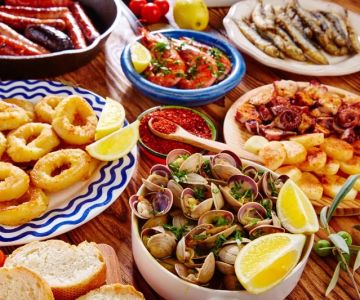
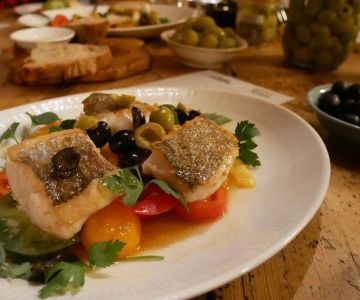


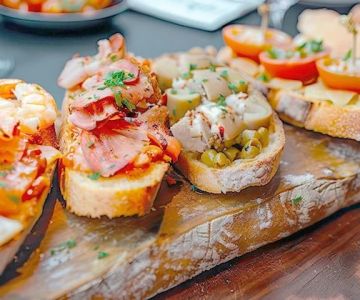
 The Iberian Pig4.0 (2790 reviews)
The Iberian Pig4.0 (2790 reviews) El Tipico Frictufinas4.0 (18 reviews)
El Tipico Frictufinas4.0 (18 reviews) El Pollo Restaurant & Bar4.0 (1237 reviews)
El Pollo Restaurant & Bar4.0 (1237 reviews)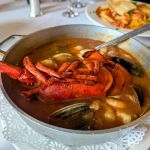 Don Pepe Restaurant4.0 (2488 reviews)
Don Pepe Restaurant4.0 (2488 reviews) A Different Beast4.0 (64 reviews)
A Different Beast4.0 (64 reviews) Costa Brava Bistro4.0 (385 reviews)
Costa Brava Bistro4.0 (385 reviews) The Best Spanish Food Markets in Pamplona for Fresh Regional Ingredients
The Best Spanish Food Markets in Pamplona for Fresh Regional Ingredients Discovering the Traditional Spanish Breakfast Recipes You Can Make at Home
Discovering the Traditional Spanish Breakfast Recipes You Can Make at Home The Best Spanish Food Markets in La Coruña for Fresh Seafood, Vegetables, and Meats
The Best Spanish Food Markets in La Coruña for Fresh Seafood, Vegetables, and Meats Best Spanish Restaurants in New York City | Top Spots for Spanish Food
Best Spanish Restaurants in New York City | Top Spots for Spanish Food The Best Spanish Restaurants in Charlotte for Tapas and Paella Nights
The Best Spanish Restaurants in Charlotte for Tapas and Paella Nights How to Make Spanish Fabada Asturiana – A Hearty Bean Stew
How to Make Spanish Fabada Asturiana – A Hearty Bean Stew